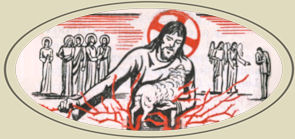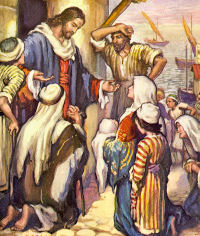Ordinary Time: June 17th
Eleventh Sunday of Ordinary Time; Father's Day (USA)
» Enjoy our Liturgical Seasons series of e-books!
"To what shall we compare the kingdom of God, or what parable can we use for it? It is like a mustard seed that, when it is sown in the ground, is the smallest of all the seeds on the earth.
But once it is sown, it springs up and becomes the largest of plants and puts forth large branches,
so that the birds of the sky can dwell in its shade."
Click here for commentary on the readings in the Extraordinary Form of the Roman Rite.
Sunday Readings
The first reading is taken from Ez 17:22-24. In this reading the prophet Ezekiel spoke about the better days that were to come for the Chosen People when Yahweh would take back His people once more, and dwell in their midst forever. Today's extract is a messianic prophecy in which God says that he will raise up a descendant–a sprig from the lofty cedar David, who will yet be the glory of Israel.
The second reading is from 2 Corinthians 5:6-10. St Paul tells his Corinthians that his constant desire and motive in life is to please God. In this he wants them to imitate him. While on earth this is his aim and when he goes to God in heaven this will be his purpose and his delight.
The Gospel is from St. Mark 4:26-34. One of the proofs of the divine origin of the Church of Christ is its growth from very humble beginnings. Christ could have come on earth in the prime of manhood, without the cooperation of any human ancestry. He could have preached his gospel to the whole world himself without any help from men. By extraordinary miracles he could have astounded the world into believing. If he wished to have the assistance of men he could have chosen the outstanding philosophers and orators of Greece and Rome. Instead, he chose to come into this world as a baby, the son of a poor mother and of a carpenter foster-father. He was born in a stable; was forced into pagan Egypt before he was a year old; he lived thirty or so years in Nazareth in poverty, earning his meager daily bread by the sweat of his brow. Then for three years he trudged the highways and by-ways of Palestine, often weary, hungry and footsore, preaching the good news of redemption. For assistants he chose fishermen, shepherds and tax-gatherers, twelve of the most ordinary of the ordinary people of his day.
When the time came for him to lay down his life for the world as prearranged by his Father, he allowed his enemies to capture him and to condemn him to the death of the cross. These were surely humble beginnings for a kingdom which was to span the earth and the ages. The mustard seed in comparison was large. Yet, this was God's plan and therefore it succeeded as he said it would. The story of his humble origins among us, of his equality with us in all things, sin alone excepted, and of his self-immolation for us, touched human hearts wherever it was told and the grace of God did the rest.
It was not the eloquence of the Apostles, nor their gift of persuasion, nor their fame for learning that moved the pagan world to forsake its idols and its vices. No, nothing but the moving grace of the Holy Spirit and the objective truth of the gospel story can explain the conversion of the Roman empire.
Therefore, the spread of the Church is a proof of its divine origin—it is from God and God is with it. Knowing this, how grateful should we not be to him who has made us members of his kingdom on earth, with the assurance of a place in his eternal kingdom in heaven, if we remain his loyal subjects here below. How good God has been to us! To what lengths of humiliation did he not go to in order to open heaven for us! When we think of Bethlehem, Nazareth, Calvary, can we dare complain because he sends us a few crosses to help us to atone for our own past sins? When we wipe the sweat of honest labor from our brow, we will think of the carpenter of Nazareth. When we feel the pinch of poverty, hunger, debt, we will think of Bethlehem and its stable and of the poor home of Nazareth. If or when the injustice of others should drive us from our home and fatherland, as is the lot of so many today, we will think of the exile in Egypt. If we are saved this humiliation we will do all in our power to help "displaced" persons wherever they may be.
The tiny mustard seed has grown into a tree but it has yet to gather many more under the shelter of its branches. Christ asks every one of his followers to help him to bring all men into the safety of his kingdom on earth, so that they may be enabled to enjoy happiness forever in his heavenly kingdom. Realizing all that God and his divine Son have done for us, would we be so mean and ungrateful as to refuse to lend a helping hand? God forbid! God has already put us on the right road to heaven; we will help him to get in the stragglers, the lazy, the "couldn't-care-less" ones on that same road, by every means available to us.
Excerpted from The Sunday Readings by Fr. Kevin O'Sullivan, O.F.M.
Commentary for the Readings in the Extraordinary Form:
Third Sunday after Pentecost
 "Rejoice with me, because I have found my sheep that was lost'. . .There will be joy in heaven oer one sinner who repents, more than over ninety-nine just who have no need of repentance" (Gospel).
"Rejoice with me, because I have found my sheep that was lost'. . .There will be joy in heaven oer one sinner who repents, more than over ninety-nine just who have no need of repentance" (Gospel).
"The Sacred Heart for the world, the world for the Sacred Heart," was the theme of last Friday's Feast. Today we witness the mutual search between the Divine Heart and our heart.
In the Introit the sinner voices his sense of being "alone" in his inner struggles, so often beyond all human aid. This life is a warfare against "your adversary the devil;" nevertheless be "steadfast in the faith;" hear the call to resist." Ultimate victory is "in Christ Jesus" (Epistle).
Who of us could ever doubt the Love of the Sacred Heart after reading this Gospel? Who of us on earth would not add to His joy in heaven by leading some soul back to His Sacred Heart?
Excerpted from My Sunday Missal, Confraternity of the Precious Blood








